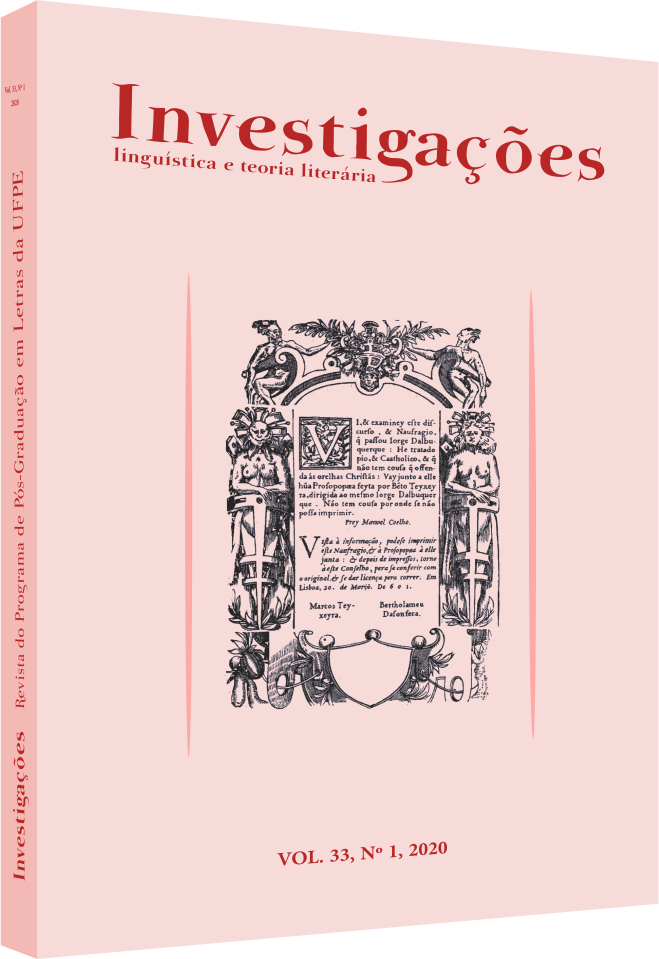Os mal-amados, de Lourdes Ramalho: tragédia moderna, regionalidade e cultura da honra
DOI:
https://doi.org/10.51359/2175-294x.2020.245025Keywords:
Lourdes Ramalho, brazilian northeast dramaturgy, modern tragedy, honor culture.Abstract
It provides an analysis-interpretation of Lourdes Ramalho’s play Os mal-amados. In this play, the image of traditional patriarchal society is threatened by the actions of the female characters due to new emerging structures, despite its “honor culture”. The way in which the proposed reading depicts these contradictions is characteristic of a Modern Tragedy, evidencing its connection with Northeast Brazilian regionality and presenting the play to a new community of readers.References
AGUIAR, Neuma. Patriarcado, sociedade e patrimonialismo. Sociedade e Estado, Brasília, v. 15, n. 2, p. 303-330, dez. 2000.
BRANDÃO, Tania. Uma empresa e seus segredos: Companhia Maria Della Costa. São Paulo: Perspectiva: Rio de Janeiro: Petrobrás, 2009.
CHIAPPINI, Ligia. Velha praga? Regionalismo literário brasileiro. In: PIZARRO, Ana (org.). América Latina: palavra, literatura e cultura. São Paulo: Memorial da América Latina; Campina, SP: Editora da UNICAMP, 1994. p. 665-702. v.2.
FERNANDES, Nanci. Os grupos amadores. In: FARIA, João Roberto (dir.). História do teatro brasileiro, volume 2: do modernismo às tendências contemporâneas. São Paulo: Perspectiva: Edições SESCSP, 2013. p. 56-80.
GOUVEIA, Valdiney V. et al. Preocupação com a honra no Nordeste brasileiro: correlatos demográficos. Psicologia & Sociedade, Belo Horizonte, v. 25, n. 3, p. 581-591, 2013.
HAESBAERT, Rogério. Região, regionalização e regionalidade: questões contemporâneas. Antares: Letras e Humanidades, Caxias do Sul, n. 03, p. 01-23, jan. - jun. 2010.
NARVAZ, Martha Giudice; KOLLER, Sílvia Helena. Famílias e patriarcado: da prescrição normativa à subversão criativa. Psicologia & Sociedade, Porto Alegre, v. 18, n. 1, p. 49-55, abr. 2006.
PITT-RIVERS, John. Honra e posição social. In: PERISTIANY, John G. Honra e vergonha: Valores das sociedades mediterrânicas. 2. ed. Lisboa: Fundação Caloute Gulbenkian, 1988, p. 11-59.
RAMALHO, Maria de Lourdes Nunes. Os Mal-Amados. In: CORRÊA NETO, Alarico et. al. Teatro paraibano, hoje. João Pessoa: A União, 1980. p. 81-150.
RIBEIRO, Lucas Mello Carvalho; LUCERO, Ariana; GONTIJO, Eduardo Dias. O ethos homérico, a cultura da vergonha e a cultura da culpa. Psychê, São Paulo , v. 12, n. 22, p. 125-138, jun. 2008.
ROHDEN, Fabíola. Para que serve o conceito de Honra, ainda hoje?. Ensaio Bibliográfico, Campos, v.2, n.7, p.101-120, ago. 2006.
SARRAZAC, Jean-Pierre. Sete observações sobre a possibilidade de um trágico moderno – que poderia ser um trágico (do) quotidiano. Pitágoras 500, Campinas, v.4, p. 3-15, abr. 2013.
SZONDI, Peter. Teoria do drama moderno (1880-1950). Trad. Luiz Sérgio Repa. São Paulo: Cosac & Naify Edições, 2001.
WILLIAMS, Raymond. Tragédia Moderna. Trad. Betina Bischof. São Paulo: Cosac & Naify, 2002.
WILLIAMS, Raymond. Drama from Ibsen to Brecht. Londres: Pelican Books, 1983.
WILLIAMS, Raymond. Marxismo e Literatura. Rio de Janeiro: Zahar, 1979.
Downloads
Published
How to Cite
Issue
Section
License
Copyright (c) 2020 Diógenes André Vieira Maciel, Monalisa Barboza Santos Colaço

This work is licensed under a Creative Commons Attribution 4.0 International License.
Authors who publish with Revista Investigações agree to the following terms:
Authors retain copyright and grant the journal right of first publication with the work simultaneously licensed under the Creative Commons Attribution 4.0 International (CC BY 4.0) license that allows others to share the work with an acknowledgement of the work's authorship and initial publication in this journal.
Authors are able to enter into separate, additional contractual arrangements for the non-exclusive distribution of the journal's published version of the work (e.g., post it to an institutional repository or publish it in a book), with an acknowledgement of its initial publication in this journal.
You are free to:
Share — copy and redistribute the material in any medium or format for any purpose, even commercially.
Adapt — remix, transform, and build upon the material for any purpose, even commercially.
The licensor cannot revoke these freedoms as long as you follow the license terms.
Under the following terms:
Attribution — You must give appropriate credit , provide a link to the license, and indicate if changes were made . You may do so in any reasonable manner, but not in any way that suggests the licensor endorses you or your use.
No additional restrictions — You may not apply legal terms or technological measures that legally restrict others from doing anything the license permits.

